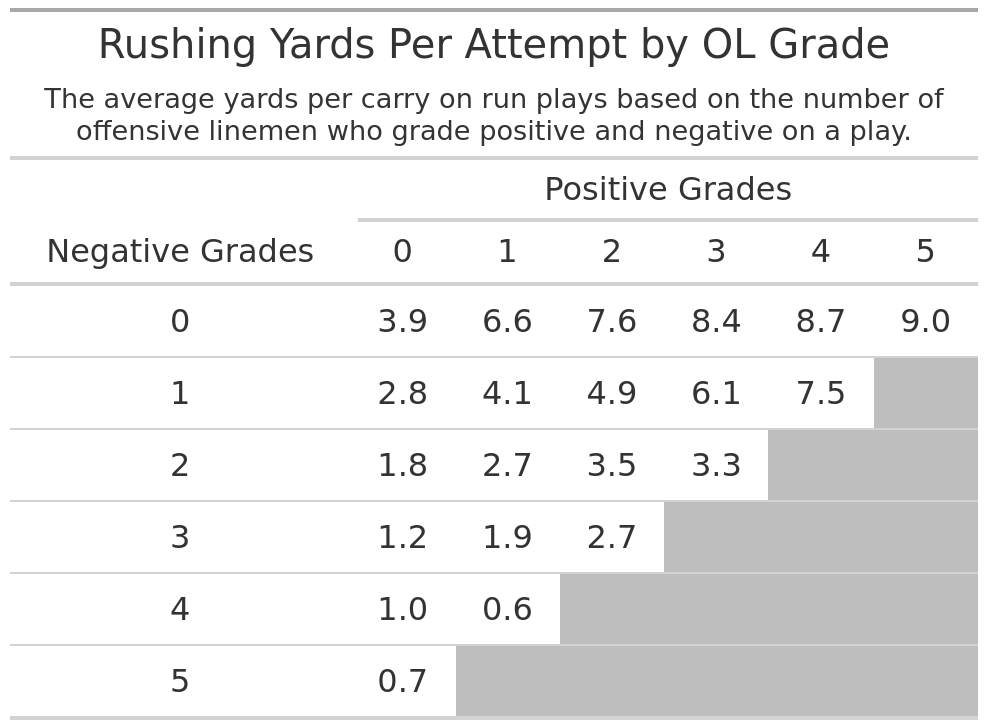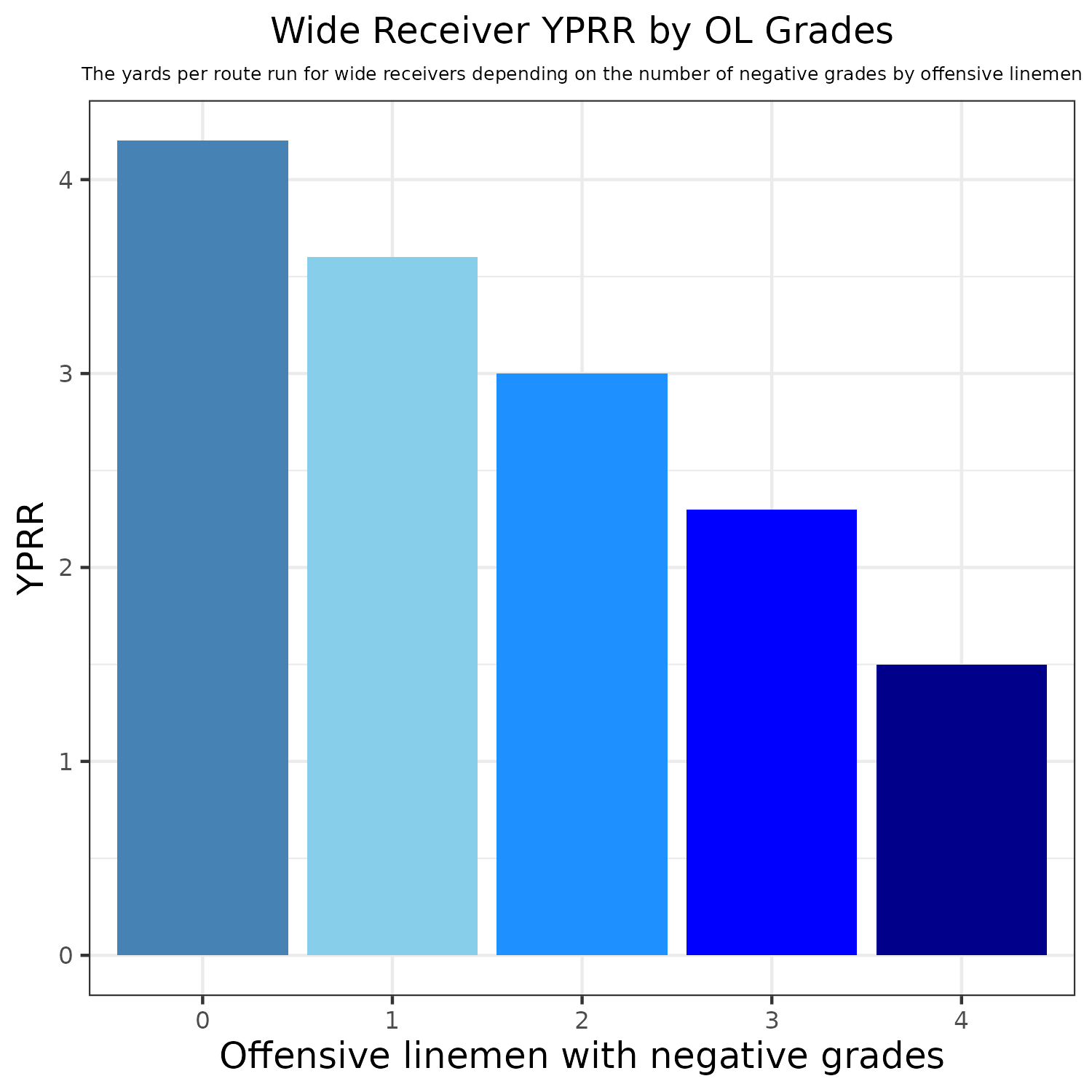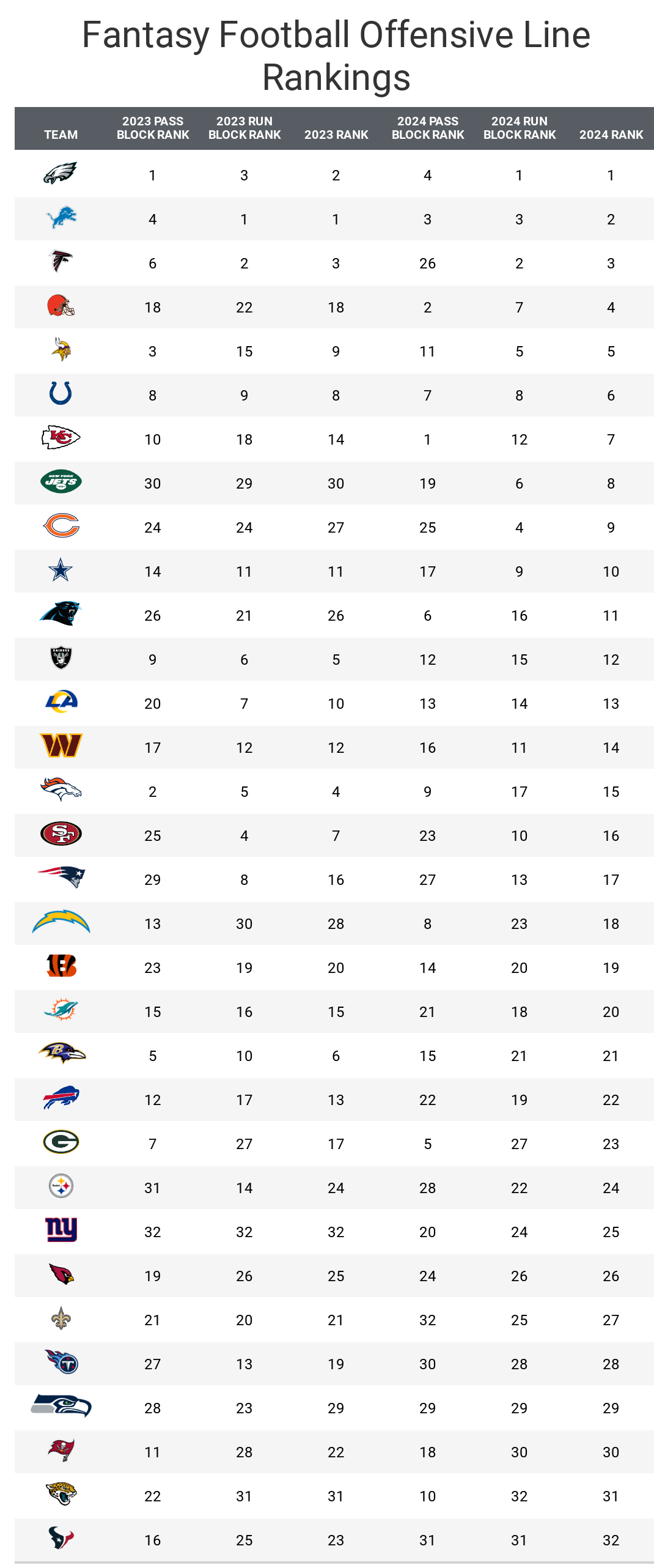• The New York Jets made multiple changes to their offensive line: The Jets kept their best linemen and also added veterans, which could lead to a huge rushing total by Breece Hall this season.
• The Philadelphia Eagles lost Jason Kelce but are still strong: They still have a few of the best starters as well as more depth than most teams.
• Dominate fantasy football season with promo code PFF25: Unlock all of PFF's fantasy content and tools, including full access to the fantasy football mock draft simulator, for 25% off using promo code PFF25.
Estimated reading time: 7 minutes
While offensive lines don’t score any fantasy points, they help skill players score fantasy points more than most realize.
Today, we’ll examine an offensive line's impact on fantasy points and rank each offensive line to see which players might see a change in their performance based on their team's offensive line changes from the offseason.
Run blocking
The relationship between an offensive line and rushing performance is straightforward — the better the offensive line blocks, the more holes that open up for the running back to make big plays and the less often the running back is hit in the backfield.
PFF's research and development team introduced the idea of perfectly blocked runs and passes. For fantasy football, it’s not just important for running backs to avoid negative grades, but it’s helpful to gain positive grades. Here are the average yards per carry for runners over the last five seasons based on the number of offensive linemen who grade positive and negative. Please note the sample sizes for some of these cells are vastly different from others — there are 19,260 plays with no positives or negatives compared to 24 where either all five are positive or all five are negative.

In general, it’s more important for offensive linemen to have more non-zero blocks than all zero blocks because positive blocks could lead to long runs whereas negative blocks, at worst, lead to a couple yard loss. For example, if a team had one play with a positive block and no negatives followed by one with one negative block and no positives, they would gain 9.4 yards while two plays with no grades would average 7.8 yards.
Team rushing grade had a 0.77 correlation between yards per attempt while team run-blocking grade was 0.50. Volume is still king in fantasy football, and the worst run-blocking offensive linemen are still receiving zero or positive grades at least 80% of the time. The quality of the running back is the next most important while run blocking is next.
Derrick Henry is a good example of the importance of his offensive line. From 2019-2020, his offensive line was among the top-five in run-blocking grade while from 2022-2023, it was below average. He led the NFL in rushing attempts all four years, but his yards per carry were 5.1 and 5.4 in the earlier years and 4.4 and 4.2 in the latter. Volume kept him as a top-eight fantasy running back all four seasons, but his average fantasy points per game dropped from 20.2 to 16.7. An offensive line isn’t going to take someone up or down several tiers, but it could move them up or down one tier and can certainly change where they rank within a tier.
Pass blocking
The relationship is similar on passing plays. The better the offensive line performs in pass protection, the better opportunities the quarterback has to get the ball to his receivers. The relationship isn’t as strong because a quarterback can overcome a poor block or throw poorly even with perfect blocking.
This section will focus on an offensive lineman's impact on wide receivers. For a tight end, the impact isn’t as strong because they are more likely to receive a quick short pass from the quarterback when they are under pressure. For running backs, if anything, the worse the offensive line, the better because it means more targets for them.

It’s worth noting that it’s incredibly rare for more than three offensive linemen to receive a negative grade on a play, so the sample sizes at four and five are very small. This relationship between pass blocking and wide receiver performance remains true on the team level. It’s also worth noting this is the yards for any of the wide receivers on a play rather than a specific wide receiver, where typically we view yards per route run by specific wide receivers.
The correlation between yards per route run and wide receiver team grade last season was 0.91 while the correlation between yards per route run and offensive line pass-blocking grade was 0.30. The wide receiver and quarterback quality combined with the competition for targets and passing volume should all play big roles in evaluating wide receivers this season, but offensive line quality should be part of the equation.
Offensive line rankings
These offensive line rankings will differ from our rankings in July for two main reasons. First, in real-life football, we care more about pass than run blocking due to how important the passing game is to winning football games. For fantasy football, since the line has more of an impact on rushing fantasy points than passing, these rankings will emphasize run blocking more. For example, the Green Bay Packers have built their offensive line around pass protection, leading Green Bay to fall down these rankings.
Second, these rankings take offensive line depth into account because most lines deal with one or two injuries throughout the year. While the Philadelphia Eagles lost Jason Kelce, they have more offensive line depth than the Detroit Lions, which moves them to the top spot.

Several offensive lines rank roughly in the same area as last season, which should lead to minimal fantasy movement. Here are the lines that changed the most in addition to how those changes should impact fantasy football this season.
New York Jets
The Jets made substantial changes to their offensive line. Their only players with offensive and run-blocking grades above 62.0 were Alijah Vera-Tucker and Joe Tippmann, and they are the only ones projected to remain in the starting lineup. The Jets brought in tackles Tyron Smith and Morgan Moses, who should be substantial upgrades both in run blocking and pass protection. While this is reason to believe Breece Hall can break more big plays in the run game, it will probably also mean Aaron Rodgers will have the time to find his wide receivers in the passing game rather than dump off to Hall.
Chicago Bears
The Bears have one of the best up-and-coming offensive lines in the league. Braxton Jones, Teven Jenkins and Darnell Wright are three solid young offensive linemen who should all be improving this season while Ryan Bates was added to take over at center. They no longer have Cody Whitehair or Lucas Patrick, who both played significantly last season and were among the lowest-graded linemen on the team. D’Andre Swift is their new running back, so he will have a downgrade compared to the Philadelphia Eagles, but it will be better than last season.
Tennessee Titans
The Titans had two offensive linemen with offensive grades and run-blocking grades in the 70s — Dillon Radunz and Aaron Brewer. Radunz is switching positions to right guard job while Brewer is now with the Miami Dolphins. The team drafted J.C. Latham in the first round, but offensive linemen generally don’t have a major impact on their first season. Tony Pollard is going to have to transition from having a consistently good offensive line with the Dallas Cowboys to this.
Denver Broncos
The Broncos have the second biggest change from their 2023 grades to now. For one, they lost center Lloyd Cushenberry III, who had a 72.1 run-blocking and 75.4 overall grade last season. They were also one of the teams that stayed healthy for most of the season with all five starters playing at least 895 offensive snaps. An inexperienced Luke Wattenberg is expected to take over at center, and he hasn’t graded well in his limited snaps. All of their backups either have career grades below replacement level or have no NFL experience. The only draft capital spent on the backups were seventh-round picks. They might only have a slight downgrade if Wattenberg plays well and everyone stays healthy, but things could fall apart quickly if there is an injury or two.




 © 2025 PFF - all rights reserved.
© 2025 PFF - all rights reserved.